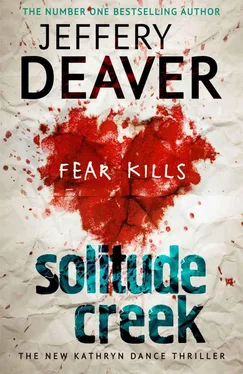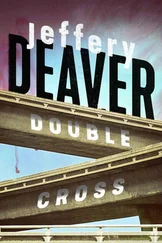A new, related story appeared. Dance turned the volume up. Henderson Jobbing had been sued by eighteen people for negligence in not securing their vehicles and keys. The commentators said bankruptcy was likely, not because of liability — it probably wasn’t responsible legally — but because defending the suit would be so expensive that it would have to close down.
‘The company has been a Monterey employer for years, providing warehouse services and running trucks throughout the state... and internationally as well. A local success story, but now, it seems, it will be shuttering its doors for good.’
Dance turned away from the screen. And thought, too, about poor Sam Cohen. The roadhouse would surely close, as well.
This is something you never recover from. Ever.
She pulled out her phone and made a call.
‘Kathryn,’ the man’s voice said.
‘You still here, Rey?’
‘Sure am.’
Rey Carreneo was an agent she described as older in heart than in years. The man had been a patrol officer in Reno, Nevada, where he’d got quite the lesson in policing. He’d had a rich past, some good, some dark, and he bore a tiny scar in the Y between his thumb and forefinger; it was where a gang tat had resided not too many years ago before he’d had it removed.
‘Need some help.’
‘Sure, Kathryn. The Serrano case?’
‘No, this is our Solitude Creek unsub. I need you to look into a couple of things. Can I come to your office in five?’
‘I’ll be here.’
Antioch March sat parked in the Honda, observing a house fifty feet away and waiting for the right moment to change Kathryn Dance’s life for ever.
He shifted. A big man, March didn’t much care for the Accord. At home he drove a full-size Mercedes, and AMG, over 500 horsepower. A present from his boss. Here, though, of course, he needed to keep a low profile.
Squinting as he looked over the house.
He was there because he’d found some quite helpful information in Dance’s Pathfinder not long ago, and an obvious plan had presented itself. On the seat beside him were his ski mask, the cotton gloves and a tire iron. He pictured dear Kathryn’s face when she learned of the tragedy here. Would she cry? Scream? Both March and the Get wondered.
He was intermittently listening to the account of the Bay View disaster and to an audiobook, Keith Hopkins’s brilliant Death and Renewal . March had failed as an academic because of the Get, not because of his intelligence: he had always read a great deal. He preferred non-fiction — biographies and histories primarily. Renewal was a scholarly work about death and social structure in ancient Rome, an era that fascinated him. The battles, the spreading of the empire, the culture. Gladiatorial contests were one of the topics covered in the book and they were of particular interest to March. He’d read whatever he could find on them, but there was little scholarship on gladiators and their world. It was astonishing to March that the bulk of the books on the topic were romance novels, featuring muscular men sweating through the strappy leather garb that encased them.
Romance novels!
My God.
He shut off the audiobook and stared at the house. He wondered how long he’d have to wait.
March relaxed, sat back.
What interested him about gladiators, of course, wasn’t the erotic side — hetero or homo — which was a product of Hollywood and, apparently, popular publishing. No, it was the institutionalization of death that was so captivating to him.
History taught, history explained. A man can’t be judged by one day: you have to examine his whole life to see trends, to see who he really is. The great leveling of time.
Mankind in general, the same.
And the world of gladiatorial contests had informed Antioch March’s being. Now, the combat itself was interesting and complicated. It had begun in a very modest form as a tribute to a deceased relative, called the munus , a fight between two or three professionals, sometimes to the death, sometimes not. Eventually Roman officials combined the munera and non-combative entertainments, like sporting events, popular with the citizenry, into gladiatorial (the word referred to ‘swordsmen’) shows.
A fan of video games forever — he still played them regularly to relax — March had decided to create one himself. It would be about gladiatorial contests, a first-person game, where you see the action as if you were participating in it. The enemy comes at you and you must fight for your survival (or, as in some of the games, you sneak up behind your foe and slit his or her throat). Thanks to books like the one he was listening to and other research, he’d learned all he needed to about the contests themselves. The next step would be learning how to craft video games. He’d played them, many to the end, for nearly twenty years and had a good idea of how they worked but he would have to learn the mechanics of putting one together and find a computer person to help.
He spent hours fantasizing about the game and imagining what it would be like to play. He even had a title: The Blood of All . It was from a poem, perhaps by Catullus, a paean to a particular gladiator, Verus, in first-century Rome. He knew the last stanza by heart.
O Verus, you have fought forty contests and have
Been offered the wooden Rudis of freedom
Three times and yet declined the chance to retire.
Soon we will gather to see the sword
In your hand pierce the heart of your foes.
Praise to you, who has chosen not to walk through
The Gates of Life but to give us
What we desire most, what we live for:
The blood of all.
He’d worked on the game off and on for years. If it became a hit, of course, he’d have to be careful to remain anonymous. A game designer would get some publicity and he supposed it wasn’t good for someone who spent his days doing, well, what he did, to be too much in the public eye. But then he figured that the project wouldn’t draw attention to him — not like a famous author. He’d never have four hundred people at a book signing, like I’m-a-Coward Richard Stanton Keller had had tonight.
Tomorrow Is the New Today. He smiled, thinking: Well, it sure wasn’t for some of the people in attendance at the Bay View.
Another glance at the house. A light was on. But—
Just then his phone hummed with a text.
He squinted and picked up the unit.
What the hell’s this? he thought. No. Oh, no...
The plans for the evening had changed.
‘How bad?’ Jon Boling asked.
‘I don’t want to talk about my day. Let’s talk about yours.’
Boling smiled. ‘I’m not sure how captivating an article on flaws in Boolean search logic will be. How about we play roast beef sandwich?’
She smiled, too, and kissed him. ‘I’m starved. Thanks.’
He whipped up plates and brought them onto the Deck, set out a glowing candle. Dance couldn’t help but think: lighting it for the dead at Bay View Center.
He opened a bottle of Jack London Cabernet. The wine wasn’t bad but she really liked the wolf on the label.
‘What’ve the munchkins been up to?’ she asked, as they sipped wine and ate the sandwiches and potato salad.
‘Mags was still moody.’
Dance shook her head. ‘I’ll sit down with her again. See if I can pry it out of her.’
‘But she seems to like her club. She was Skyping with them for an hour or so.’
‘Oh, what’s it called? The Secrets Club.’
‘That’s it. Bethany and Cara. Lucie too, I think. Pretty exclusive, it sounds like.’
Читать дальше












